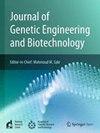Utilizing deep learning algorithms for the early identification and categorization of skin cancer
IF 2.8
Q3 Biochemistry, Genetics and Molecular Biology
Journal of Genetic Engineering and Biotechnology
Pub Date : 2025-09-26
DOI:10.1016/j.jgeb.2025.100576
引用次数: 0
Abstract
Skin cancer is one of the utmost global challenges for today human being. Diverse forms of skin cancer found in humans, but current research work focuses on malignancy. The malignant can be treated easily if detected in the early stage. To achieve this goal, image processing and deep learning techniques were performed for the distinguished melanoma in early stages. Utilizing three models such as EfficientNet-B0, VGG16, and Inception-V3, the process involved initial preprocessing of image followed by training these models for 30 epochs on the PH2 and ISIC datasets. All three models demonstrated strong performance on both dataset; however, EfficientNet-B0 outperformed the other two models with an accuracy of 92 %, while Inception-V3 achieved 87 % accuracy and VGG-16 achieved 85 % accuracy. It has been established from the results that we aspire to enhance our suggested idea by incorporating it into a mobile platform in forthcoming endeavors. This modification will allow users to access and employ the model’s capabilities on the go, enhancing its reach and impact. The mobile platform will have an easy-to-use interface, allowing users to provide data and get reliable outcomes. This integration will not only increase the accessibility of the model, but also improve its value, making it easier for individuals to adopt it into their daily lives. By doing so, we hope to boost the model’s adoption and utilization, resulting in more accurate predictions and better decision-making.
利用深度学习算法进行皮肤癌的早期识别和分类
皮肤癌是当今人类面临的最大全球性挑战之一。在人类中发现多种形式的皮肤癌,但目前的研究工作主要集中在恶性肿瘤上。如果在早期发现,恶性肿瘤很容易治疗。为了实现这一目标,对早期阶段的黑色素瘤进行了图像处理和深度学习技术。利用effentnet - b0、VGG16和Inception-V3三种模型,该过程包括对图像进行初始预处理,然后在PH2和ISIC数据集上训练这些模型30个epoch。所有三种模型在两个数据集上都表现出较强的性能;然而,EfficientNet-B0以92%的准确率优于其他两种模型,而Inception-V3的准确率为87%,VGG-16的准确率为85%。从结果来看,我们希望在未来的努力中通过将其纳入移动平台来增强我们建议的想法。这种修改将允许用户在旅途中访问和使用模型的功能,增强其覆盖范围和影响。移动平台将有一个易于使用的界面,允许用户提供数据并获得可靠的结果。这种集成不仅可以增加模型的可访问性,还可以提高其价值,使个人更容易将其应用到日常生活中。通过这样做,我们希望促进模型的采用和利用,从而实现更准确的预测和更好的决策。
本文章由计算机程序翻译,如有差异,请以英文原文为准。
求助全文
约1分钟内获得全文
求助全文
来源期刊

Journal of Genetic Engineering and Biotechnology
Biochemistry, Genetics and Molecular Biology-Biotechnology
CiteScore
5.70
自引率
5.70%
发文量
159
审稿时长
16 weeks
期刊介绍:
Journal of genetic engineering and biotechnology is devoted to rapid publication of full-length research papers that leads to significant contribution in advancing knowledge in genetic engineering and biotechnology and provide novel perspectives in this research area. JGEB includes all major themes related to genetic engineering and recombinant DNA. The area of interest of JGEB includes but not restricted to: •Plant genetics •Animal genetics •Bacterial enzymes •Agricultural Biotechnology, •Biochemistry, •Biophysics, •Bioinformatics, •Environmental Biotechnology, •Industrial Biotechnology, •Microbial biotechnology, •Medical Biotechnology, •Bioenergy, Biosafety, •Biosecurity, •Bioethics, •GMOS, •Genomic, •Proteomic JGEB accepts
 求助内容:
求助内容: 应助结果提醒方式:
应助结果提醒方式:


